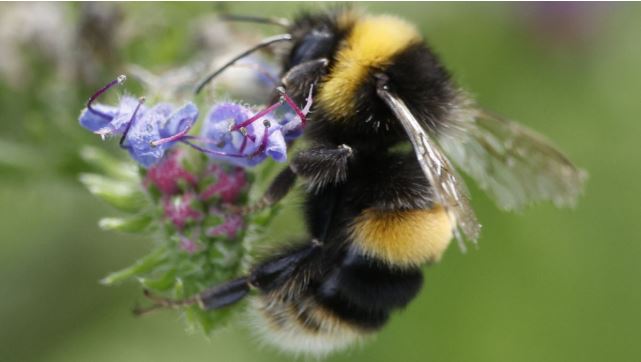


 10:47:39
10:47:39  2025-11-12
2025-11-12  971
971

In the latest test of the tiny workings of bumblebee minds, scientists have taught the fuzzy insects to tell the difference between patterns of light – a kind of simplified Morse code – to find a sugary treat.
It's the first demonstration that Bombus terrestris can make decisions about where to forage based solely on the duration of a visual cue. This means that bumblebees can process temporal information, much like vertebrates can – an ability that could mean the difference between life and death, out in the wild world.
"We wanted to find out if bumblebees could learn the difference between these different durations, and it was so exciting to see them do it," says behavioral scientist Alex Davidson of Queen Mary University of London in the UK.
In recent years, scientists have been discovering hidden depths to bee cognition that have blown our minds. Not only do bumblebees seem to practice a form of farming, but they can work together and teach each other how to solve puzzles in a way that was thought way too advanced for their little noggins.
Plus, some other species of bees have demonstrated the ability to comprehend and use some basic concepts of math.
Being able to recognize duration is a skill that can help animals in many ways, from foraging and mating to predator evasion. Davidson and his colleagues decided to test this ability in bumblebees, designing an experiment to see if the insects can tell the difference between a short flash of light and a long one – the basic units used in Morse code.
First, the bees were presented with a screen that displayed two flashing lights in a small foraging arena – one flashing at a longer duration, and the other at a shorter duration.
One experiment compared 5-second pulses and 1-second flashes, while others used 2.5-second blinks for the long-duration stimuli and 0.5 seconds for the short ones.
One duration was associated with a sugary reward – something the bees love – and the other with a bitter substance called quinine, which they absolutely do not. The researchers mixed it up, showing different groups of bees different reward signals.
The first stage of the experiment was learning which duration was associated with sugar, and which with quinine. The bees were set to navigate the maze to find the treats, until they reached a success threshold of 15 correct guesses out of 20.
Then, it was time to see if they had truly learned the timing pattern by removing the reward entirely, to make sure they weren't just smelling the sugar or using other cues.
Even without the sugar, the bees chose the timing pattern associated with the reward more frequently than can be attributed to chance – suggesting that they were able to distinguish short and long flashes of light.
How and why they are able to do this, however, remains a mystery.
"Since bees don't encounter flashing stimuli in their natural environment, it's remarkable that they could succeed at this task. The fact that they could track the duration of visual stimuli might suggest an extension of a time processing capacity that has evolved for different purposes, such as keeping track of movement in space or communication," Davidson says.
"Alternatively, this surprising ability to encode and process time duration might be a fundamental component of the nervous system that is intrinsic in the properties of neurons. Only further research will be able to address this issue."
It does, however, remind us that complex cognitive processes can take place in a brain the size of a puppy seed, and the abilities we may have once considered unique to humans are more common throughout the animal kingdom than we may have guessed.
Reality Of Islam |
|

Researchers

A well-know

Scientists

As AI-power
 9:3:43
9:3:43
 2018-11-05
2018-11-05
10 benefits of Marriage in Islam
 7:5:22
7:5:22
 2019-04-08
2019-04-08
benefits of reciting surat yunus, hud &
 9:45:7
9:45:7
 2018-12-24
2018-12-24
advantages & disadvantages of divorce
 11:35:12
11:35:12
 2018-06-10
2018-06-10
 6:0:51
6:0:51
 2018-10-16
2018-10-16
 6:0:8
6:0:8
 2023-03-19
2023-03-19
 1:16:44
1:16:44
 2018-05-14
2018-05-14
 9:39:36
9:39:36
 2022-12-28
2022-12-28
 2:11:12
2:11:12
 2022-10-15
2022-10-15
 12:10:56
12:10:56
 2022-11-17
2022-11-17
 2:34:48
2:34:48
 2022-01-18
2022-01-18
 6:28:21
6:28:21
 2022-12-20
2022-12-20
 5:41:46
5:41:46
 2023-03-18
2023-03-18
| LATEST |